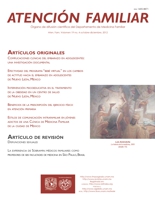Types of Interfamilial Communication of Young Addicts attending a Family Medicine Clinic in Mexico City
Main Article Content
Abstract
Summary
Objective: to identify types of communication that prevailed in families with addicted children and how they are translate in behaviors that contribute or not in maintaining addiction according to the meaning given by the families. Material and methods: qualitative and interpretive study of three families with addicted adolescents, who attend the “Gustavo A. Madero” Family Medicine Unit (UMF) of the Institute for Security and Social Services for the Workers of the State (ISSSTE). A not random sampling was conducted by convenience of six persons: three mothers and their three children, using the technique of semi-structured and audio-taped interviews; a voluntary participation, their identity was protected with the anonymity; their dignity was respected and the confidentiality of their testimonies was ensured. Results: addicted adolescents of the three families grew up in homes with negative and violent communication patterns associated with dysfunctional behaviors (low school performance, aggressive interpersonal relationships as well as feelings of mistrust, insecurity and neglect), which affected their cognitive, relational and emotional development. In this context the consumption of addictive substances appears as a mechanism of evasion before the choice of facing and modifying their patterns of interaction. By this way, it also explains the homeostatic role of addiction in order to divert attention to another family situation. Conclusions: with more thoughtful and propositional patterns of communication, styles to face conflicts can change, avoiding them to become chronic. A proper communication protects families and influences in other contexts minimizing adverse social influences.
